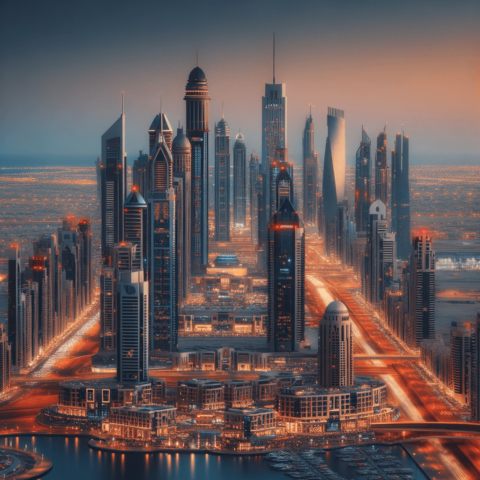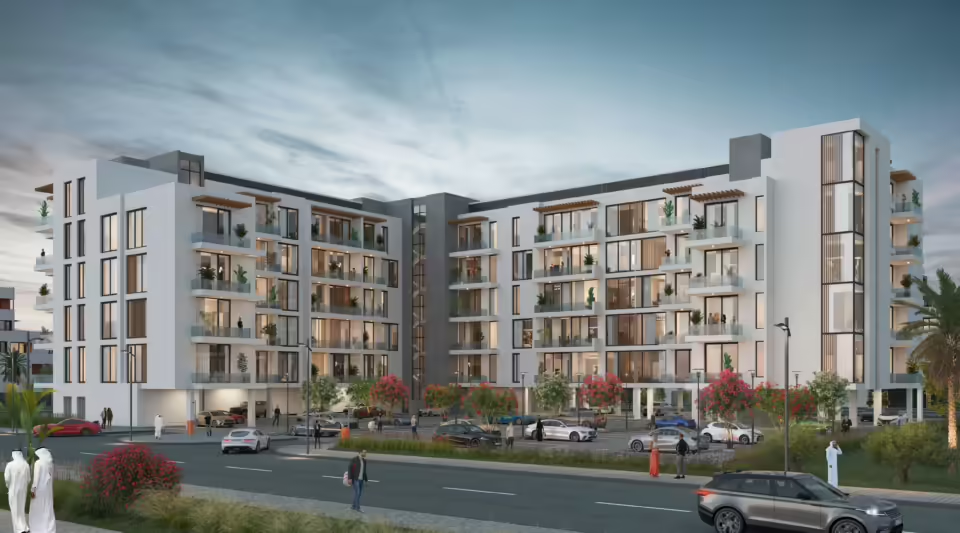
Investing in Dubai Real Estate: Exploring Off-Plan and Ready Properties
June 22, 2024
Discover Exceptional Living: Francoferri’s Exquisite Pieces Brought to You by Interiors
June 23, 2024The United Arab Emirates (UAE) has cemented its position as a global investment hub, taking the second place in new greenfield foreign direct investment (FDI) projects in 2023. This milestone reflects its dynamic economic environment and its allure for businesses and investors worldwide.
UAE’s Strategic Rise in Global FDI Rankings
The UAE’s meteoric rise in foreign direct investment (FDI) rankings is a testament to a combination of strategic factors. One of the primary drivers behind this success is the government’s proactive and investor-friendly policies. For instance, the establishment of free zones and the easing of regulations that previously limited foreign ownership have opened new avenues for investors. These measures have been instrumental in attracting significant capital inflows.
Another critical factor is the UAE’s strategic geographical location. Situated at the crossroads of East and West, the UAE serves as a gateway to emerging markets in Africa, Asia, and Europe. This prime location is not only beneficial for logistics and trade but also serves as an attractive proposition for businesses looking to establish a foothold in multiple regions.
Economic diversification efforts have also played a crucial role. Traditionally reliant on oil, the UAE has made significant strides in diversifying its economy, focusing on sectors like technology, renewable energy, and tourism. This diversification has made the UAE more resilient and appealing to a broader range of investors.
The numbers speak volumes about this strategic rise. The UAE saw a remarkable 33% increase in new FDI project announcements from 2022 to 2023. This spike in new projects has propelled the nation two places up in the global rankings, securing the second spot. With a total of 1,323 new greenfield projects, the UAE’s allure as a premier investment destination is undeniable, underscored by a robust investor-friendly climate that offers stability, innovation, and growth potential.
Economic Impact of FDI Inflows in the UAE
The economic impact of the $30.688 billion in foreign direct investment (FDI) inflows the UAE received in 2023 is profoundly transformative, directly influencing various sectors and fostering a burgeoning environment for development.
In the *real estate* sector, substantial FDI has accelerated urban development and upscale housing projects, contributing to a 12% increase in property values across key cities. Major players like Emaar Properties and Aldar Investments have initiated new residential and commercial developments, bolstering both local and expatriate housing markets.
The *technology* sector has seen a surge in innovation hubs and tech parks, driven by investments from global giants like Microsoft and Amazon Web Services. This focus has not only enhanced the nation’s digital infrastructure but has also created approximately 10,000 high-skilled jobs, nurturing a vibrant tech ecosystem. According to the Ministry of Economy, tech-centric FDI projects have grown by 27% compared to the previous year, highlighting a shift towards a knowledge-based economy.
In *tourism*, investments in new hotels, resorts, and entertainment complexes have fostered an increase in international visitors, reaching an all-time high of 21 million tourists in 2023. The introduction of world-class attractions and luxury accommodations has solidified the UAE’s status as a premier global tourism destination.
*Infrastructure* development has been another major beneficiary, with significant capital directed towards enhancing transportation networks, including the expansion of the Dubai Metro and the development of Abu Dhabi’s airport. Such projects are integral to supporting economic activities and have resulted in improved logistics, facilitating smoother business operations and attracting additional commercial enterprises to the region.
Overall, the influx of FDI has acted as a catalyst for diversified economic advancement, with each sector reaping substantial benefits from the enhanced capital flow. This capital infusion underscores the UAE’s dynamic and appealing business environment, further cementing its position as a global economic powerhouse.
Greenfield Projects Driving Innovation and Growth
Greenfield projects are new ventures initiated from scratch on undeveloped land, offering a clean slate for innovation and development without the limitations of existing structures or legacy constraints. These projects are especially pivotal for the UAE’s economic growth, as they allow investors to create state-of-the-art facilities tailored to modern standards, facilitating cutting-edge advancements and operational efficiencies. The rapid proliferation of such projects in 2023 underscores the UAE’s strategic efforts to diversify its economy and enhance its global competitiveness.
For instance, the announcement of the Dubai Free Zone Council’s new technology park epitomizes a key greenfield project in 2023. This park aims to attract tech startups and multinational corporations by providing world-class infrastructure and regulatory incentives. Similarly, the establishment of the Sharjah Research, Technology, and Innovation Park highlights the UAE’s commitment to fostering a vibrant ecosystem for scientific research and innovation. These projects not only drive technological advancements but also create substantial job opportunities, thus contributing to socio-economic stability.
The advantages of greenfield projects in the UAE extend beyond economic growth; they also foster a dynamic business environment. By enabling companies to design infrastructure that aligns with the latest technological trends, these ventures promote efficiency and sustainability. The flexibility to innovate without the constraints of existing systems significantly attracts global investors, reinforcing the UAE’s position as a premier investment destination. As greenfield projects continue to proliferate, they play an indispensable role in stimulating innovation, generating employment, and ultimately driving the nation’s economic growth.
Comparative Analysis with Global FDI Leaders
Comparative Analysis with Global FDI Leaders:
The UAE’s rise to second place globally in new FDI projects in 2023 marks a significant milestone, especially when compared to established leaders like the United States. Both nations share similarities in their strategic approaches, such as tax incentives, streamlined business regulations, and robust infrastructural frameworks. However, key differences delineate their methods of attracting foreign investment.
The UAE has emphasized the development of greenfield projects as a central pillar of its FDI strategy. By creating new ventures from the ground up without the constraints of existing infrastructure, the UAE offers investors a blank canvas to innovate, significantly enhancing the appeal of its market. This proactive approach contrasts with the US, where investments often lean towards mergers and acquisitions of existing entities, benefiting from the established market presence but also inheriting legacy issues.
Another distinguishing factor is the UAE’s focus on diversifying its economy away from oil dependency. The nation has heavily invested in sectors like technology, renewable energy, and logistics. This broad diversification provides a cushioning effect against global market fluctuations, offering investors stability and numerous opportunities across various fields. Meanwhile, while the US is also diverse, its FDI appeal is largely driven by its dominant technology and finance sectors, creating a narrower, though still robust, focus.
Key lessons from the UAE’s strategy include the importance of governmental support in setting up new and investor-friendly economic zones. These zones often come with attractive tax benefits, simplified administrative procedures, and strong legal protections for foreign investors. Other countries aiming to boost their FDI can glean insights from the UAE’s targeted use of these incentives to create a dynamic and attractive business environment.
Moreover, fostering a global business hub with a multicultural workforce enhances the UAE’s attractiveness to international businesses. The UAE has nurtured an environment where talent from across the globe can thrive, which has, in turn, attracted global capital. This people-centric approach could be emulated by other nations to enrich their talent pools and, consequently, appeal to investors seeking a versatile and skilled workforce.
By examining the UAE’s innovative and inclusive strategies towards its FDI initiatives, other nations can understand the importance of not only offering financial incentives but also creating a forward-thinking and adaptive business infrastructure.
Future Prospects for Investment and Business in the UAE
The promising trajectory of the UAE in securing substantial foreign direct investments appears destined to continue its upward ascent. One pivotal element underpinning this optimistic outlook is the UAE government’s unwavering commitment to fostering a conducive environment for investment. Future policy frameworks are expected to extend beyond mere fiscal incentives, encompassing a combination of regulatory reforms and infrastructural enhancements. Recent discussions indicate potential broad-based legislative adjustments, such as enhanced protection for intellectual property rights and streamlined procedures for business registration and taxation.
The sectors poised for immense growth are notably diverse. Technology, with a specific emphasis on AI and fintech, stands at the forefront. Dubai’s ambitious plans for smart cities and blockchain implementation illustrate a proactive stance towards technological advancement. Meanwhile, the green energy sector, buoyed by the UAE’s commitment to sustainable development, presents an attractive avenue for investors. Solar energy projects in the region are expected to witness significant expansion, aligning with the National Green Growth Strategy.
Additionally, the healthcare and biotechnology realms are projected to attract considerable attention. The government’s increased focus on healthcare infrastructure development and high-tech medical research facilities is likely to draw substantial foreign investments.
Industry experts forecast an era marked by dynamic growth and diversification. According to market analysts, the UAE’s strategic location, robust infrastructure, and forward-thinking policies will continue to make it a prime destination for investors seeking stability and high returns. The evolving landscape presents emerging opportunities, particularly in start-ups and SMEs, further cementing the UAE’s standing as a global investment hub poised for sustained growth.
Conclusions
In conclusion, the UAE’s ascension to the second place globally in new FDI projects underscores its strategic importance in the global economy. This achievement highlights its robust investment climate, making it an attractive destination for entrepreneurs and tourists alike, fueling continuous growth and innovation.





